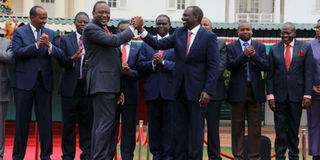To unite all its people, government must endeavour to develop the entire country

President Uhuru Kenyatta, his Deputy William Ruto and officials of parties that will merge and form the Jubilee Party at State House Nairobi on August 9, 2016. PHOTO | JEFF ANGOTE | NATION MEDEA GROUP
What you need to know:
- Transforming the governing Jubilee Alliance into Jubilee Party, Mr Ruto said, embodies the dreams of Kenya’s founding fathers who sought to form a nation every region can be proud to belong to as well as take on the challenge posed by the ethnicisation of politics.
- The President said Jubilee was founded on a sacred covenant that never again will political disagreement and competition lead to mayhem and bloodshed.
- Raila Odinga, accused President and Deputy of plotting to take Kenya back to single party rule.
- Amani National Congress leader Musalia Mudavadi similarly warned against a return to a one party state and life presidential terms.
When on Tuesday President Uhuru Kenyatta and Deputy President William Ruto unveiled the intended merger of 12 parties, their The National Alliance and United Republican Party respectively included, they each said the aim was to foster the unity of Kenyans.
Transforming the governing Jubilee Alliance into Jubilee Party, Mr Ruto said, embodies the dreams of Kenya’s founding fathers who sought to form a nation every region can be proud to belong to as well as take on the challenge posed by the ethnicisation of politics.
The President said Jubilee was founded on a sacred covenant that never again will political disagreement and competition lead to mayhem and bloodshed. Jubilee, he went on, was a bold declaration of confidence in a movement primed to create a country which reflects our diversity as well as unity.
Well spoken and carefully chosen words. But the political arena is shared and politics is characterised by dispute and debate. The Orange Democratic Movement’s kingpin, Raila Odinga, accused President and Deputy of plotting to take Kenya back to single party rule and warned that the days of Kanu’s monopoly of power were long gone.
His Amani National Congress counterpart Musalia Mudavadi similarly warned against a return to a one party state and life presidential terms. He accused President and Deputy of deliberately presiding over a process engineered to claw back on the constitution and take Kenya back to repressive single party rule.
Well spoken and deliberately chosen words. But who is speaking the truth? First, political parties are created for the purposes of fighting and winning elections; forming and controlling governments; determining public policy; and keeping power for as long as they can.
Second, elections, as I say, are not called in order that they unite people. They are called in order that people may make choices between competing parties, personalities and platforms.
This divides people. Third, politics is characterised by dispute and debate especially about the distribution and application of national resources or wealth.
If the incoming Jubilee Party seeks to play the political game and unite the people of Kenya under the party, then it will have to eschew the politics as has been practised since independence in a complete paradigm shift. Is that coming?
Now, does Jubilee want to take Kenya back to single party rule? Kenya has more than 60 registered parties and when 12 of them merge that, in my view, cannot amount to re-introducing political monopoly. The framers of the current constitution, aware of how President Kenyatta and President Moi systematically mutilated the original basic law, made it increasingly difficult to amend the document.
What the Jubilee move may have aimed to do is to isolate the opposition constellation that is the Coalition for Reforms and Democracy and or force it to splinter into individual parties. But it could also be an opportunity for the coalition to morph into a single party. The latter move would possibly set in motion a process where Kenya would ultimately end up with two strong parties as is the case in the US and UK.
Now how would two strong parties or one strong party unify Kenyans? The drive by President and Deputy appears premised on the long held view that when all are in the party of government or when all are in government, then, all realise development. Or, better still, to realise development, then, a people or groups, have to be in government.
My view is that this does not unite. Why? Because the people who form parties are Kenyans. The people they form parties for are Kenyans. And the people that become card causing members of parties are Kenyans first before they join parties of their choice. The parties and their members go into elections as Kenyans and, win or lose, they remain Kenyans.
Therefore to channel resources into those areas or to those groups whose parties won elections and formed government only is to victimise and exclude those Kenyans whose choices lost political competitions. That is to curtail the development of Kenya, that is to fight Kenya and to retard it by setting some regions against others. That divides.
What must guide Kenya’s politics is that government must be constituted for the development of the entire country. That will unite. In and out of government, this must be the creed of every political party. It is government’s job to unite Kenyans. Will a big Jubilee Party mean a big tent of government and not one dominated by two communities?





